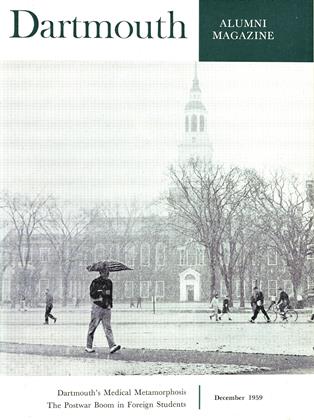By Robert Frost '96.New York: Henry Holt, 1959. 94 pp. $3.00.
This attractive book, illustrated with appropriate wood engravings by Thomas W. Nason, has a felicitous foreword by Robert Frost's good friend, Hyde Cox; and is dedicated to Mr. Frost's mother, "who knew as a teacher that no poetry was good for children that wasn't equally good for their elders."
I am almost tempted to say that poetry which doesn't strike a spark in children lacks something for elders. At any rate, leafing through these familiar poems, it occurred to me that there are few contemporary poets whom one could confidently read to children. One would hardly expect a child, for instance, to be entranced by The Waste Land or the Four Quartets. (Old Possum's Book ofPossible Cats is, to be sure, another matter.) A child's taste is hardly an infallible criterion of poetry, of course. Yet a child was not stumped by Emerson's Brahma: she said it meant "God everywhere"; and a child's comment on Stopping by Woods on a SnowyEvening has pleased Mr. Frost more than the profundities of Freudian commentators.
In short Frost's poetry has a quality, too rare in contemporary poetry, that can charm children of all ages: the quality of magic. Magic marks the songs of Shakespeare, or such a passage as
... daffodils That come before the swallow dares, and take The winds of March with beauty.
It is a quality, alas, which offers little grist for critics or professors: it does not require, indeed defies, explication or annotation. Yet it is the essence of poetry and Mr. Frost's poetry has it. With him it is not pretty-pretty, nor even faery, necessarily; it may be sombre rather:
The barren bough without the leaves Without the birds, without the breeze.
Or fanciful, as in ''Fireflies in the Garden," emulating the real stars in the upper air. Or even perverse as in "Come In":
But no, I was out for stars: I would not come in. I meant not even if asked, And I hadn't been.
But children are often perverse; and sputniks haven't dimmed for them the wonder of the stars. If I had to characterize Frost's uniqueness in a phrase or two, I think I'd say, not that he was the poet of New England (among other regions) or of the commonplace, or any number of the other things that you might say (and that have been said); but that of all hi- contemporaries he imparts at once the magic that captivates children and the impression of being most at home among the stars.
 View Full Issue
View Full Issue
More From This Issue
-
 Feature
FeatureDartmouth's Medical Metamorphosis
December 1959 -
 Feature
FeatureStudents from Abroad
December 1959 By J.B.F. -
 Feature
FeatureMary Baker Eddy and Dartmouth
December 1959 By JOHN B. STARR '61 -
 Feature
FeatureSTEFANSSON
December 1959 By ALAN COOKE '55 -
 Class Notes
Class Notes1921
December 1959 By JOHN HURD, LINCOLN H. WELD -
 Class Notes
Class Notes1918
December 1959 By THOMAS E. SHIRLEY, W. CURTIS GLOVER
STEARNS MORSE
-
 Books
BooksTHE TEACHING OF ENGLISH: AVOWALS AND VENTURES
JUNE, 1928 By Stearns Morse -
 Article
ArticleSidney Cox Prize Established
November 1953 By Stearns Morse -
 Books
BooksTHE AMERICAN NOVEL AND ITS TRADITION.
December 1957 By STEARNS MORSE -
 Books
BooksIN THE CLEARING.
May 1962 By STEARNS MORSE -
 Books
BooksSELECTED PROSE OF ROBERT FROST.
OCTOBER 1966 By STEARNS MORSE -
 Books
BooksEmpty Rooms
September 1975 By STEARNS MORSE
Books
-
 Books
BooksAlumni Articles
MARCH 1971 -
 Books
BooksCALCULUS OF VECTOR FUNCTIONS.
NOVEMBER 1962 By H. MIRKIL -
 Books
BooksALL THE BEST IN EUROPE.
March 1955 By H. WENTWORTH ELDREDGE '31 -
 Books
BooksNOW IS THE MOMENT,
October 1943 By John G Gazley -
 Books
BooksSCANDALOUS PRINCESS; THE EXQUISITE THERESIA CABARRUS
January 1933 By Paul Allen -
 Books
BooksREADINGS IN THE FAMILY
March 1935 By R. P. Holben

